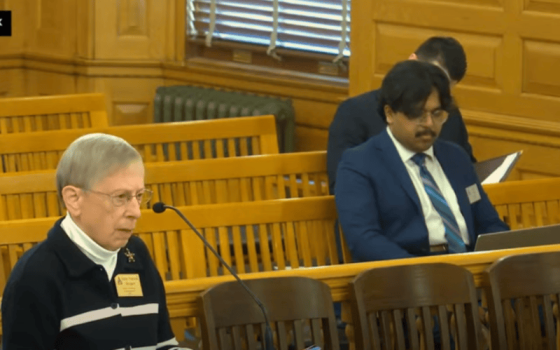If you are in the San Francisco area, you may be interested in this event about Secure Communities and what Catholics and people of other faith traditions are saying. NCR received a press release this morning:
-
Event to Stop the Deportations and the Separation of Our Families,
January 28th, 2pm, St. Mary's Cathedral (1111 Gough St. San Francisco, CA)On January 28th we are uniting as a city-wide, faith community (and especially the Catholic community) to announce our solution to the division of families, the increase of fear, and the lack of immigrant trust in the local police: the Trust Act of 2012 (presented in the State Assembly by Assemblyman Tom Ammiano). This act will help prevent further deportations caused by S-COMM (the text is still being drafted and will be discussed at the event). We will listen to the testimony of immigrant family members affected by S-COMM, we will share further information on S-COMM's now 55,000 deportations in California, we will participate in prayer, and stand with a variety of local and state government officials, police and sheriff's officers, and other public figures that support the immigrant community. We will do this so that our faith community's collective voice can be heard by the Governor in support of the Trust Act, against S-COMM, and in favor of family unity.
So far, San Francisco Archbishop George Niederauer, Bishop Bill Justice, Episcopal Bishop Otis Charles, several leaders from the Muslim, Jewish, and Christian communities, and state Assemblyman Tom Ammiano will be attending. The San Francisco Organizing Project (SFOP), the lead organization bringing this community together and an affiliate of the PICO National Network of faith communities, has invited Governor Brown and Attorney General Kamala Harris to attend.
For more information about the event, you can call Emmanuelle Leal of SFOP at 415-730-9090.
---
Here is more information from the press release:
-
The Secure Communities ProgramIn 2008, the Immigration and Customs Enforcement agency (ICE) began to approach state governments and counties one by one to enlist local law enforcement agencies (police and sheriff’s departments) in immigration policing through the Secure Communities program (S-COMM). Under S-COMM, police participate in immigration policing by digitally collecting and distributing to ICE the fingerprints of all people merely booked in city and county jails. These people may have committed only minor, non-violent, non-felony crimes or no crime at all (ie. they may only be accused of a crime). The digital images of the fingerprints are then crosschecked with ICE databases to verify the citizenship status of the person booked. If the person is identified as undocumented, ICE then sends a "detainer" request to the local police force to request that the person be held for ICE to take into custody and then route through deportation procedures.
The negative effects of this program for our Catholic community are many:
1) It hampers municipal policing: The municipal police rely on local (and in many cases immigrant) testimony to crimes so that the police can more effectively solve the crimes. If an immigrant community is afraid to call the police because police officers may treat them as criminals, book them, and turn them over to ICE for deportation, they will refrain from notifying the police or from providing them information, allowing the true criminals to remain free among the entire city population.
2) It does not solve the crime problem: ICE pitched this program to counties and states, telling them that it would more efficiently identify and deport the most serious undocumented criminal offenders (those who already had a criminal record). However, according to ICE's statistics, from October 2008 to February 2011, California deported 35,643 undocumented immigrants using S-COMM, 27% of which were non-criminals (including domestic abuse survivors and people who committed minor traffic offenses), and an additional 41% of which were classified as ICE low-level offenders including misdemeanors (source: U.S. Immigration and Customs Enforcement, Secure Communities IDENT/IAFIS Interoperability Monthly Statistics, October 27, 2008 through February 28, 2011). Therefore, S-COMM is not targeting the most serious undocumented criminal offenders, but the immigrant community as a whole, regardless of criminal record.
3) It tears families apart and therefore, our Catholic Church: When an immigrant is arrested, for instance, for driving a car without a license, is booked, and set through deportation proceedings without any prior notice, their children, brothers and sisters, mothers, fathers, and church community are left wondering where their family member or friend is, often for weeks. Children of immigrants (many who are citizens and who are too young to take care of themselves) are left without parents, and elderly grandparents are left without their children to care for them. It creates psychological trauma, longing, loss, stress, and in many cases destitution.



